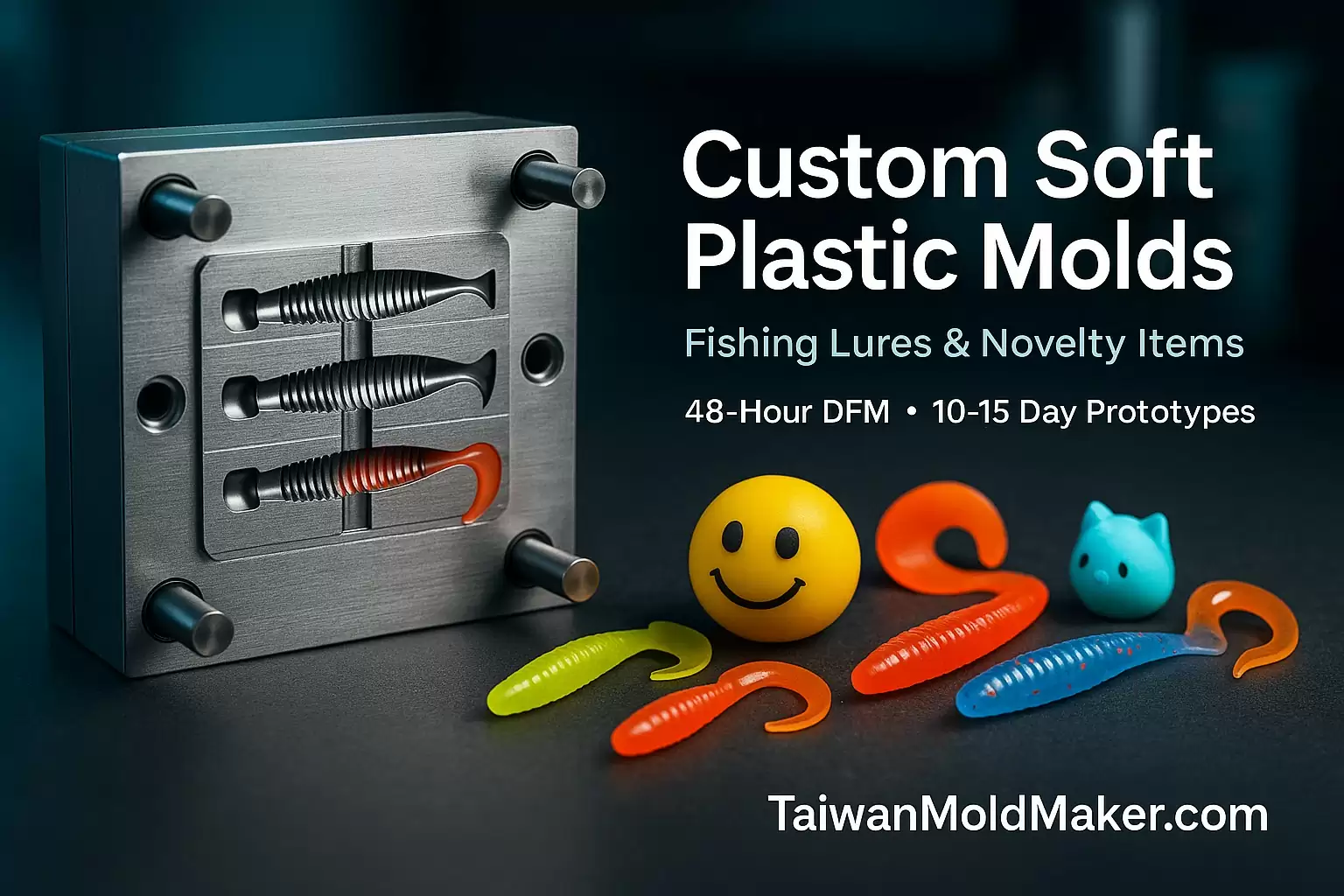Design Custom Soft Plastic Molds for Specialized Fishing Lures and Novelty Items
Design Custom Soft Plastic Molds for Specialized Fishing Lures and Novelty Items
Anglers judge a soft bait by how it moves; consumers judge a novelty by how it feels. Both demands point to the same place: precise, repeatable soft-tooling that captures micro-detail, controls durometer, and keeps cycle times short. At TaiwanMoldMaker.com, we design and cut custom soft plastic molds—from single-cavity prototype tools to high-output multi-cavity blocks—for specialized fishing lures and soft novelty items with production-grade consistency.
1) Choose the Right Material for Action, Feel, and Compliance
| Material | Durometer (Shore A) | Best For | Highlights |
|---|---|---|---|
| Plastisol PVC (phthalate-free) | 5–40 (super soft) / 45–70 (medium) | Worms, swimbaits, creature baits, tubes | Tunable sink rate (salt load), accepts glitter/scents, clear/translucent colors |
| TPE/TPR (SEBS/TPV) | 10–90 | Durable lures, novelty keycaps, stress toys | Heat-weldable, recyclable, high tear resistance |
| LSR (Liquid Silicone Rubber) | 10–70 | Baby-safe novelties, food-contact gadgets | Silky feel, wide temp range, platinum-cure options |
| PU Soft Foam / Elastomers | 20–60 | Large novelty items, cosplay props | Feather-light, paintable skins |
Tip for lure designers: Start with two durometers (e.g., A 20 tail for action + A 40 body for hook retention). We can run 2K overmold in one mold set for laminated color bands or tail/body combinations.
2) Mold Platforms—From One-Off Prototypes to Production
| Mold Type | Lead Time | Shot Life | When to Use |
|---|---|---|---|
| RTV Silicone Prototype | 2–4 days | 50–200 pulls | Fast A/B testing, hand-pour or injector trials |
| CNC Aluminum (6061/7075) | 10–15 days | 50k–200k+ | Production lures & novelties; excellent heat transfer |
| Steel Inserts / Hybrid | 3–5 weeks | 500k+ | Abrasive fillers, ultra-high output, micro-details |
We support hand-pour, syringe/injector, and low-pressure injection setups, or full press-based injection with hot runners for TPE/TPR and LSR.
3) Fishing-Lure Design Guidelines (Action First)
-
Tail Mechanics: Thin sections 0.8–1.2 mm for paddle/curly tails; add subtle taper to prevent “dead tail” at cold water temps.
-
Body Geometry: Keep wall transitions gradual; ribbing adds turbulence (more flash) without adding mass.
-
Hook & Rig Features: Mold belly hook slots, line-through channels, and insert weight pockets directly into the cavity.
-
Gating & Venting: Gate into the thickest body section; micro-vents 0.02–0.05 mm at tail tips and fin edges eliminate air kisses.
-
Lamination & 2-Color Effects: Use laminate gates or 2K indexing for back/belly color splits and blood-line stripes.
-
Buoyancy Control: Specify salt % (sink rate) or micro-balloons (float) by weight; we validate density in a standard column test.
4) Novelty-Item Design Guidelines (Feel + Safety)
-
Texture: VDI 24–36 hides knit lines while keeping a cleanable surface.
-
Draft: 1–2° works for most soft parts; increase for heavy textures.
-
Wall Thickness: 2–6 mm typical; add flow channels on large, flat faces to avoid sink.
-
Compliance: We can build to EN71/CPSIA, REACH/RoHS, and food-contact requirements; phthalate-free, BPA-free options available.
-
Branding: In-mold deboss/emboss logos or IML (in-mold labeling) for durable graphics.
5) Process Windows That Work
-
Plastisol (soft baits): Gel/cure typically 160–180 °C; mold at 25–40 °C; controlled cool to prevent post-shrink.
-
TPE/TPR injection: Melt 180–220 °C; mold 20–40 °C; medium-high fill, short hold to protect softness.
-
LSR: Cold-runner dosing, mold 150–200 °C; rapid cure with optional post-bake for compression-set targets.
We run a mini-DOE at T-0 to lock the action/feel window (tail amplitude, rebound, tear resistance), then save the “golden recipe” to our MES.
6) Tooling Features that Elevate Quality
-
Balanced runner & fan gates for uniform fill along long bodies.
-
Conformal cooling in aluminum for tight cycle control on TPE/TPR.
-
Alignment dowels & keyed inserts to preserve flash lines on micro-fins.
-
Polish strategy: SPI-A2 on hinge lines and clear parts; directional polish on action tails to avoid surface drag.
-
Quick-change plates so you can swap cavity designs (tail variations, rib counts) in minutes.
7) Options & Special Effects
-
Embedded 3D eyes, foil flashes, holographic mica, and glitter suspensions.
-
Scent channels and post-dip infusion; solvent-free topcoats for sheen.
-
2K tail tips, color laminates, and swirl/marble effects.
-
Laser-etched scales and micro-textures that catch light underwater.
8) Case Snapshot — 5" Paddle-Tail Swimbait (Two-Color, Salted)
| Metric | Before (generic mold) | With TaiwanMoldMaker.com |
|---|---|---|
| Tail start-up speed (0.5 m/s tow) | Inconsistent | Reliable kick at lower speed |
| Scrap (air at tail) | 6.2% | 0.9% (micro-vent map) |
| Cycle time (hand injector) | 90 s | 58 s (optimized runner & heat balance) |
| Retail complaint rate | 1.8% | <0.4% (tear-resistant tails) |
9) How We De-Risk Your Program
| Risk | Our Countermeasure |
|---|---|
| Air traps & “kisses” on fins | CFD-assisted vent map + vacuum assist on long cavities |
| Soft part deformation | Controlled demold temperature + guided ejectors |
| Color drift & glitter pooling | Mix specs by weight; low-shear gating; agitation protocols |
| Regulatory uncertainty | Material COAs, phthalate/FDA docs, EN71/CPSIA test plans |
| Scaling from hobby to retail | Aluminum multi-cavity with copy-cavity strategy and inline packaging |
10) Fast Engagement Roadmap
-
Upload CAD or sample photos (outline, length, target durometer, sink/float preference).
-
Receive a 48-Hour DFM & Cost Pack—gate/vent map, texture plan, cycle model, and price tiers.
-
Approve prototype (RTV or single-cavity aluminum) → first pulls in 2–4 days.
-
Lock action/feel → move to multi-cavity aluminum with optional 2K.
-
Add scent, glitter, packaging, and ship—retail-ready.
Quick Links
-
✔️ Mold Service
-
✔️ Molding
Ready to turn a sketch into a best-seller?
Request an Instant Quote →
We’ll design and cut the custom soft plastic mold that gives your lure the right action—and your novelty item the perfect feel—on a schedule your launch can trust.









